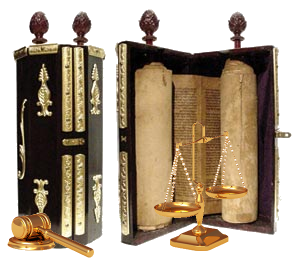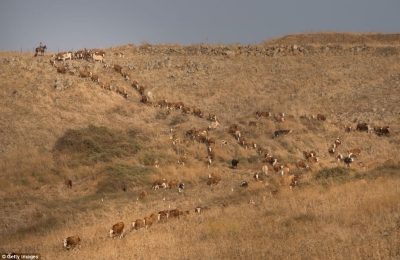Lëkh Lᵊkhâ 4th Eve

Refuse A Gift Of Tainted Money!
 |
The king of Sᵊdom, immorally caring more about currying favor with AvᵊrâmꞋ than his people's welfare, stood up and offered AvᵊrâmꞋ all the booty as a gift if he would just return the people of Sᵊdom he had freed – principally Lōt and his family – back to their homes in Sᵊdom.
The treasure offered by the king belonged not to him but to the liberated citizens of Sᵊdom. It didn't belong to the king to give away.
So AvᵊrâmꞋ turned down the money except what they had eaten and a share for his 3 officers, lest anyone think that it was the king of Sᵊdom and his tainted money that had made AvᵊrâmꞋ wealthy!
ä' Promises A Son To AvᵊrâmꞋ By Barren Sâr•aiꞋ
Through these events ä' told him one evening that He was the Mâ•geinꞋ Av•râmꞋ and that AvᵊrâmꞋ would receive a great wage.
But then AvᵊrâmꞋ thought, "A•don•âiꞋ ä', What profit is any wage when I have no children to whom I can pass it down. Everything You show me, that I teach them, will be inherited by my Syrian CEO from Damascus, Ël•i•ëzꞋër."
 |
| SeiphꞋër Tor•âhꞋ (Tei•mân•iꞋ) & Beit Din |
Then it hit him; the reply of ä' occurred to him: No one but his own descendants could inherit his wealth and teachings. You must, and shall, have a descendant to inherit your wealth, most especially your wealth of spiritual insights and teachings (which developed into the Tor•âhꞋ we know today).
As he mused on these things, AvᵊrâmꞋ strolled outside into the cool evening ruꞋakh, under the night sky, and was inspired by the countless stars. "May ä' multiply my descendants to be as countless as the stars," he prayed. So AvᵊrâmꞋ trusted in ä' and considered that it was a tzᵊdâq•âhꞋ for Him. Just as countless descendants would be good for AvᵊrâmꞋ, so, too, countless descendants raised in the teachings of ä' would be a good thing for ä'.1
Homesteading A Ranch
 |
ä' brought me here all the way from Ur to find good land to homestead, AvᵊrâmꞋ mused, so that I could pass the land on to my descendants as an inheritance.
Homesteading a ranch is one thing; but operating on the promise that the land of Kᵊna•anꞋ would be his "as far as he could see in all directions, grazing throughout the length and breadth of the land" meant seriously going out and conquering surrounding city-kings throughout Kᵊna•anꞋ to take it as his possession to build a qâ•doshꞋ landed-kindred nation for ä'. Well, that required a serious reality check to be certain he was interpreting ä' accurately – and not just dreaming-up some off-the-rails, delusion of grandeur in his own mind.
Granted, most of Kᵊna•anꞋ along the mountain ridge was ruled by tiny city-kings whom his battle-hardened battalion could defeat. But, once he incorporated a number of city-kingdoms into his own single nation he would be noticed by the big powers in the region – Syria, Egypt and even Iran. Defending the land after he had conquered it would be a much gnarlier problem. And there were periodic droughts to survive.
So he prayed, "A•don•âiꞋ ä', How can I be certain that I'm interpreting Your Will correctly? That I and my descendants – who don't even exist yet – are charged with conquering and making qâ•doshꞋ the entire land of Kᵊna•anꞋ?"
AvᵊrâmꞋ never doubted ä''s capability. He instinctively knew better than to test-try ä'. But whether AvᵊrâmꞋ was interpreting ä' correctly was an entirely different issue – and AvᵊrâmꞋ realized that if he was misinterpreting his own thoughts for ä''s instructions; if ä' wasn't backing him, then he would fail. AvᵊrâmꞋ needed to demonstrate that he was going forward based entirely on his trust in ä', which he had already expressed earlier. He could demonstrate this by means of a bᵊrit wherein each would be a partner in this venture.2 – not test-proving ä' (for the Creator-Singularity Who set the laws of the universe in motion, all human affairs are trivial).

Optional parental preparation:
- Get out a starchart and show how to find the polar star, constellations and various planets.
- Note 1 – This can be understood – correctly – both ways. A tzᵊdâq•âhꞋ is a tzᵊdâq•âhꞋ irrespective of who performs it. Since ä' is the Tza•diqꞋ, His Will is Tza•diqꞋ by definition and, conversely, we are logically sound in expecting, and labeling, every element of His Will to be a tzᵊdâq•âhꞋ to/for Him, and to/for us, the same. Conversely, what is a tzᵊdâq•âhꞋ to/for ä' is no less a tzᵊdâq•âhꞋ for AvᵊrâmꞋ. So, "he" (whether ä' or AvᵊrâmꞋ) would have considered countless descendants the same: to be a tzᵊdâq•âhꞋ, both for "him" (AvᵊrâmꞋ) or "Him" (ä'). Caveat: while "reckoned" in the sense of "considered" is valid, the English (and Christian) connotation of "imputed" or "assigned," deriving from the English "reckoned," is not a valid connotation from the original Hebrew term: åÇéÌÇçÀùÑÀáÆäÈ.

- Note 2 – Interpreters who have never understood this ritual assume, and inject, a "sign" where there was none. The Hebrew term for "sign," àåÉú, is nowhere found in this chapter. Nor does any sign occur; only a ritual to illustrate the bᵊrit and a dream.

Questions you might anticipate that your child might raise and be prepared to discuss:
- What is "currying favor"?
- What is welfare?
- What is "tainted" money?
- What is an officer?
- What is "moral" and "immoral"?
- What does "barren" mean?
- What was a shield in ancient times?
Google+ registered author & publisher

